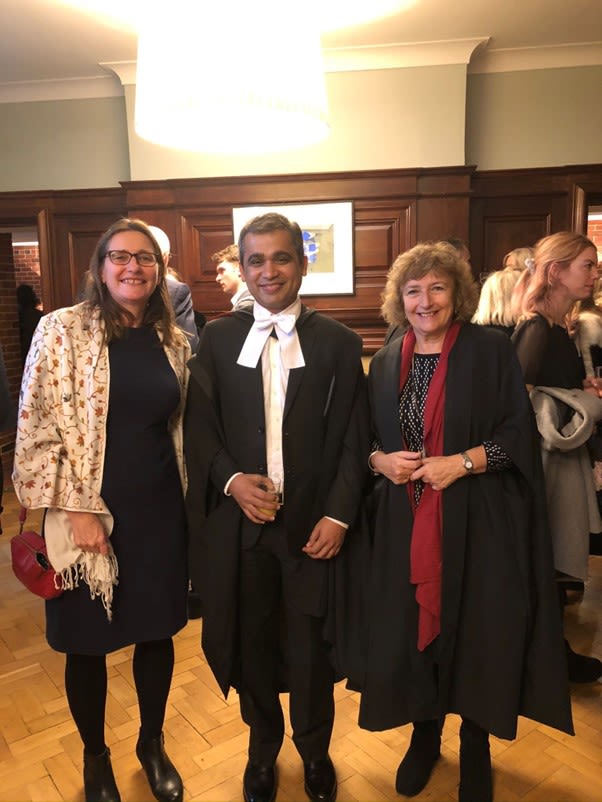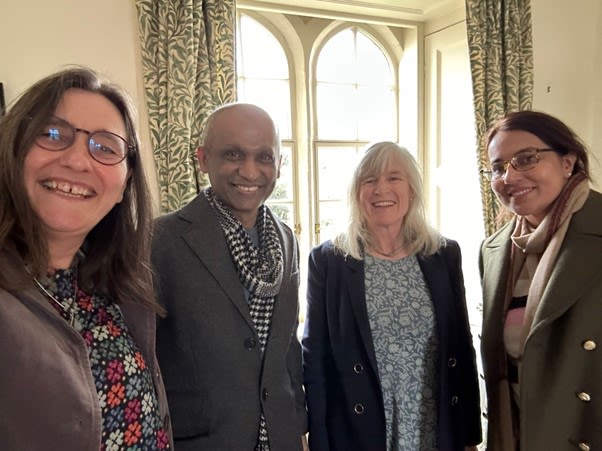

Celebrating the life of Dr Arif Naveed
Professors Pauline Rose and Madeleine Arnot with Arif at his doctoral graduation ceremony in Cambridge.
Professors Pauline Rose and Madeleine Arnot with Arif at his doctoral graduation ceremony in Cambridge.
With great sadness, we are sharing the news that our dear friend and colleague, Dr Arif Naveed, passed away on Saturday 9 November. While battling cancer for several years, it was incredible to see how Arif remained so positive and hopeful, and we shared his hope. He always had a warm smile and sense of humour, putting everyone around him at ease despite the pain he was experiencing. He remained committed to his academic work and fight for social justice throughout.
His commitment to social justice led him to study for master’s degrees in economics at Quaid-i-Azam University in Islamabad, international development at the University of Bath, and an MPhil in education research at the University of Cambridge. He was subsequently awarded a prestigious Gates scholarship for his doctoral study in the Faculty of Education at Cambridge, with Professors Madeleine Arnot and Anna Vignoles as his supervisors. His doctoral research focused on whether a rethinking of education in Pakistan needed to respond to local priorities and meet the aspirations of citizens. In 2018, he was selected by his peers for the Bill Gates Sr Award in recognition for his outstanding research and social leadership. As one of his award nominators stated: “Arif Naveed is one of the most remarkable people I have ever met. Arif is exceptional. He has built revolutionary reforms for poverty and education that will affect hundreds of millions of people.” In 2019, he was appointed as postdoctoral fellow at the British Academy and as lecturer at the University of Bath, where he was soon promoted to senior lecturer in Education and International Development.
Born in south Punjab, Arif questioned why bright students in his school had dropped out of the education system. This question has shaped his career in education research. In 2008, he became country lead for Pakistan on the Department for International Development (DFID)-funded RECOUP programme, which focused on improving educational outcomes. This programme was led by Professor Christopher Colclough in the Faculty of Education, at Cambridge. Through his subsequent PhD, Arif further developed a keen interest in the interfaces between the disciplines of sociology, economics of education, and development studies. His major contributions were innovative methods involving the statistical analysis of schooling and intergenerational social mobility in post-colonial contexts, as well as the highly influential innovative Habitus Listening Guide to recognise the polyphonic voices of the poor. In June this year, he published a journal article illustrating the power of this guide, entitled ‘More Snakes Than Ladders’, to wide acclaim. Through his theoretical and empirical work, Arif challenged the assumed transformative potential of mass schooling in Southern contexts fuelled by global expansionary agendas. He argued for a wider reform agenda to address structural inequality as a precondition for the meaningful uptake of mass schooling in such contexts.
An article published about Arif’s life and achievements earlier this year by a fellow PhD student, Peter Sutoris, describes Arif as “a scholar of poverty and inequality, a maverick social scientist who does not adhere to norms and expectations of “the field”.” Indeed, we used to joke with Arif that he was the only person who could successfully bridge Bourdieu and Becker, breaking down disciplinary barriers between sociology and economics through his commitment to social mobility through education.
From an early stage in his career, Arif had a strong desire to influence education policy in Pakistan. As his Bill Gates Sr award identified, his policy influence has been wide-ranging. He developed a highly influential disaggregated multi-dimensional approach to the ‘geography of poverty’ in Pakistan. The impact of these reforms was considerable internationally, with The Economist calling them exemplary for developing countries. Arif co-authored a report for the US Commission on International Religious Freedom which was reported to be linked to a reduction in the negative portrayal of religious diversity in public school textbooks in Pakistan. His methodological work informed the Pakistan Poverty Alleviation Fund to identify and prioritise the poorest regions for poverty reduction aid.
Arif mentored and supported many new researchers who, like him, came from disadvantaged backgrounds. He was founding member of the South Asian Approaches to Education (SAARE) Network. International recognition led to his role as Academic Enhancement Advisor for staff at the University of Gwadar in Pakistan, consultancies with the Pakistan Ministry of Planning, Development and Special Initiatives, with FCDO educational reform projects in Punjab, and advisory work for the Taleem Foundation, which runs schools in poor districts. His expertise linking research to policy was such an inspiration to us in the REAL Centre.
Our deepest condolences and thoughts go to Arif’s wife Sana, and all his family, friends and colleagues. We will work together with those who knew Arif across our academic communities, in Cambridge and beyond, to identify appropriate ways to commemorate his life. Please do get in touch if you would like to share any thoughts about Arif, need any support at this difficult time, or to share ideas about how we could commemorate Arif’s life and work.
Professor Pauline Rose and Emerita Professor Madeleine Arnot
Professors Pauline Rose and Anna Vignoles with Arif and his wife Sana.
Professors Pauline Rose and Anna Vignoles with Arif and his wife Sana.

